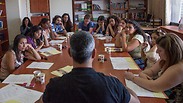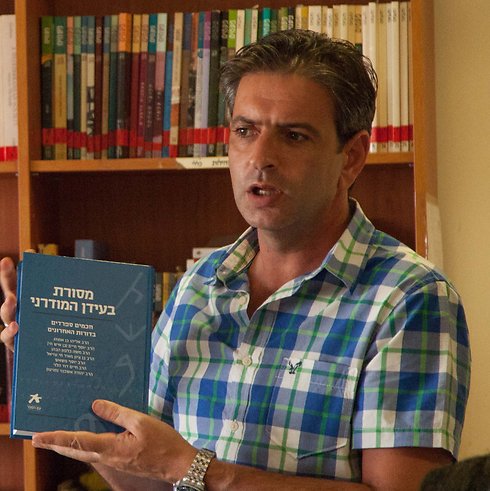
Do-gooders, take heed: The periphery can do very well without you
The weak is the new strong. Social organizations that deal with the periphery and Israeli Jewish values are trying to harness traditional Jewish ideas pertaining to social issues to the modern-day world. How is it coming along? If you ask them – it is a remarkable success.
The last general election in Israel gave rise, and with good reason, to questions of social inequality in the country, and made them a top priority in the public debate. The politicians, in an attempt to woo undecided voters, excelled at reciting every detail of the National Insurance Institute's poverty report and speak of underprivileged communities, the ongoing discrimination against those living in the periphery and the few opportunities facing those living there.
Alongside those who "talk the talk" but take little action, there are several organizations that do sacred and wonderful work year round, and actively try to help those in need, regardless of the elections.
But perhaps unlike other organizations, the true motivation of these activists is the humane Jewish tradition that comes from the Scriptures, and is integrating into a reinvented, homegrown type of quintessentially Israeli Judaism. The values of helping others, aiding the weak and "love thy neighbor" are traditional Jewish values that organizations such as BINA (Wisdom), Elul, Atid Bamidbar (Future in the Desert) and Mimizrach Shemesh (East of the Sun) are translating into modern and contemporary Israeli life, and trying to create a better social reality.

In the past, it was believed that in order to help the disadvantaged population, stronger communities need to be integrated in those areas to "balance the equation." However, this mentality has changed in recent years. The more common approach nowadays is that in order to "truly" strengthen "the weak," the latter need to be empowered, to be shown their own inner strength and be persuaded that they too are strong enough to create and to develop, without any help from external parties.
The force within
This theory is already being implemented in different cities across Israel – through a project called "BINA Ba-Shchuna" (BINA in the neighborhood). The project runs in the low-income neighborhoods of Tel Aviv-Jaffa, Be'er Sheba and Nazareth Illit. The BINA organization operates various programs, including work at schools, organizing afterschool clubs and a project for adults called "A Community Celebrating." All programs are run by the volunteers of BINA.
According to the volunteers, all activities emanate from the neighborhood's residents, who take part in the programs as workers or advisers. The goal is clear: To strengthen the local community. The volunteers note that despite the fact that funding has been cut for some of the projects, they continue to run with the locals operating them themselves.
Another example of encouraging local leadership in underprivileged communities comes from "Mimizrach Shemesh – Kol Israel Chaverim" (East of the Sun – All Jews Bear Responsibility for One Another). The organization sees itself as a Midrash (a Torah lesson) for social leadership that prompts social activists and community leaders into social action, inspired by the heritage of the Mizrahi (Middle Eastern) Jews.
"We believe that strengthening the connection to Jewish tradition, which is based on social values through volunteer work within the community, helps the Jewish People as a community of solidarity, and connects the Israeli people to the spiritual foundation that led to the establishment of the State," Moshe Shriki, the director of Mimizrach Shemesh , told Ynet.
A project of local pride
According to Shriki, the organization believes that there exists a tradition of social responsibility, which derives from Jewish values.
"Judaism is not about how knowledgeable one is, but about how one behaves," he says. "It is about to what extent one is socially sensitive, and how one acts towards a better Israeli society. This kind of Judaism guides us to choose to see injustice and to strive to maintain a society of solidarity, which cannot tolerate issues such as exclusion, poverty or any harm to the disadvantaged."
Shriki points to a program called "Netu'im" (Rooted) – a biennial youth program that operates in the peripheral towns of Migdal Ha'Emek, Tirat HaCarmel, Afula, Ofakim and Bnei Brak's Pardes Katz neighborhood. The program is aimed at cultivating a strong local leadership that would strengthen the periphery by keeping its educated young people. Each year, the program selects 15 local students who take part in 25 group study sessions throughout the year.
"Young people who grew up in the periphery and saw it as the center of their lives are a great force of social action," says Shriki. "But when the moment comes to settle down, we witness a phenomenon of emigration and decline of powerful forces in the periphery."
According to him, these very youngsters, and not outsiders, can be a force of social change within their communities.
"The program was one big experience, we received tools and understood how deeply we are connected to our city, how much we love it and how it is truly our home," says Illanit Ovadaiev, a Netu'im graduate in Migdal Ha'Emek. During the program the students met with local leaders, from whom they learned how to promote issues close to their hearts.
In addition, the young people study at the Midrash, which focuses on social issues, through which the pupils shape their moral world view, that relies on Tikkun Olam (repairing the world) and social engagement.
"During the program we encountered passages from the Talmud and the Holy Scriptures, and learned to understand that these are not just old verses, but ideas that directly relate to modern life, "Ovadaiev says. "I was personally affected by this, and today, as a teacher in Migdal Ha'Emek, I teach some of the passages and convey these important messages to my students."
Social values of the Jewish tradition
"The curricula are not just a source of inspiration, or a source of authority, but a link in a chain," says Shriki. "The student is faithful to the Jewish story, as told by generations past, but at the same time open to the interpretation that should be handed down to the next generation."
He adds that the curricula at the Midrash combine the rich Jewish tradition of the Sephardic Jews, as well as the open and fruitful tradition with modern times. In his opinion, the combination of all these elements creates a Jewish identity that is moderate and empathetic, and focuses on social values.
Netu'im deals with the practical side, too. The students take part in a social entrepreneurship course, in which the pupils, in teams, locate community assets that could become the infrastructure for community growth. Through them, the students create new opportunities for their community, and initiate a project with local pride. Every year, the students give back to the community 600 hours of volunteer work and organize three community holiday events.
"Along with my partner, I worked towards establishing a group for youths of the Caucasian community in the city, with whom I studied and acted to deepen the tradition of the Caucasian community and the Jewish tradition through the social scene," says Ovadaiev. "I was also part of a project to reconstruct the forest that is adjacent to the city and other social projects. The issue became highly important to me."
Towards the end, Shriki highlighted that these are "gifts" that are worthy of sharing with the entire Israeli society. "This helps create a cross-ethnic identity that includes all segments of the Israeli society."










